- Home
- Barbara Pym
A Glass of Blessings
A Glass of Blessings Read online
Barbara Pym
A Glass of Blessings
When God at first made man,
Having a glasse of blessings standing by;
Let us (said he) poure on him all we can :
Let the world's riches, which dispersed lie,
Contract into a span.
GEORGE HERBERT: THE PULLEY
First published by Jonathan Cape 1958 Published in Penguin Books 1980 Reprinted 1981,1982
Copyright (c) the Estate of Barbara Pym, 1958 All rights reserved
The author thanks the literary Trustees of Walter de la Mare
and Messrs. Faber and Faber Limited, for permission to quote the lines
from the poem 'Autumn', which appear on page 82.
Chapter One
Chapter Two
Chapter Three
Chapter Four
Chapter Five
Chapter Six
Chapter Seven
Chapter Eight
Chapter Nine
Chapter Ten
Chapter Eleven
Chapter Twelve
Chapter Thirteen
Chapter Fourteen
Chapter Fifteen
Chapter Sixteen
Chapter Seventeen
Chapter Eighteen
Chapter Nineteen
Chapter Twenty
Chapter Twenty-one
Chapter Twenty-two
Chapter Twenty-three
Chapter One
I suppose it must have been the shock of hearing the telephone ring, apparently in the church, that made me turn my head and see Piers Longridge in one of the side aisles behind me. It sounded shrill and particularly urgent against the music of the organ, and it was probably because I had never before heard a telephone ringing in church that my thoughts were immediately distracted, so that I found myself wondering where it could be and whether anyone would answer it. I imagined the little bent woman in the peacock blue hat who acted as verger going into the vestry and picking up the receiver gingerly, if only to put an end to the loud unsuitable ringing. She might say that Father Thames was engaged at the moment or not available; but surely the caller ought to have known that, for it was St Luke's day, the patronal festival of the church, and this lunch time Mass was one of the services held for people who worked in the offices nearby or perhaps for the idle ones like myself who had been too lazy to get up for an earlier service.
The ringing soon stopped, but I was still wondering who the caller could have been, and finally decided on one of Father Thames's wealthy elderly female friends inviting him to luncheon or dinner. Then a different bell began to ring and I tried to collect my thoughts, ashamed that they should have wandered so far from the service. I closed my eyes and prayed for myself, on this my thirty-third birthday, for my husband Rodney, my mother-in-law Sybil, and a vague collection of friends who always seemed to need praying for. At the last minute I remembered to pray for a new assistant priest to be sent to us, for Father Thames had urged us in the parish magazine to do this. When I opened my eyes again I could not help looking quickly at the side aisle where I had caught a glimpse of the man who looked like Piers Longridge, the brother of my great friend Rowena Talbot.
She usually spoke of him as 'poor Piers', for there was something vaguely unsatisfactory about him. At thirty-five he had had too many jobs and his early brilliance seemed to have come to nothing. It was also held against him that he had not yet married. I wondered what could have brought him to St Luke's at lunchtime. I remembered Rowena telling me that he had recently obtained work as a proof-reader to a firm of printers specializing in the production of learned books, but I had understood that it was somewhere in the city. I did not know him very well and had seen very little of him recently; probably he was one of those people who go into churches to look at the architecture and stay for a service out of curiosity. I stole another quick look at him. In novels, or perhaps more often in parish magazine stories, one sometimes reads descriptions of 'a lonely figure kneeling at the back of the church, his head bowed in prayer', but Piers was gazing about him in an inquisitive interested way. I realized again how good-looking he was, with his aquiline features and fair hair, and I wondered if I should have a chance to speak to him after the service was over.
When this moment came, Father Thames, a tall scraggy old man with thick white hair and a beaky nose, was standing by the door, talking in his rather too loud social voice to various individuals - calling out to a young man to keep in touch - while others slipped past him on the way back to their offices, perhaps calculating whether they would have time for a quick lunch or a cup of coffee before returning to work.
Although I had quite often been to his church, which was near where I lived, Father Thames and I had not yet spoken to each other. Today, as I approached him, I had the feeling that he would say something; but rather to my surprise, for I had not prepared any opening sentence, I was the one to speak first. And what I said was really rather unsuitable.
'How strange to hear a telephone ringing in church! I don't think I ever have before,' I began and then stopped, wondering how he would take it.
He threw back his head, almost as if he were about to laugh. 'Have you not?' he said. 'Oh, it is always ringing here, although we have another one at the clergy house, of course. Usually it's business, but just occasionally a kind friend may be inviting me to luncheon or something of the sort. People are so kind!'
So it could have been as I had imagined. But there were two priests at the clergy house. Were the invitations always for Father Thames and never for mild dumpy little Father Bode, with his round spectacled face and slightly common voice, who always seemed to be the sub-deacon at High Mass and who had once read the wrong lesson at a carol service? I was sure that Father Bode was equally worthy of eating smoked salmon and grouse or whatever luncheon the hostesses might care to provide. Then it occurred to me that he might well be the kind of person who would prefer tinned salmon, though I was ashamed of the unworthy thought for I knew him to be a good man.
'As a matter of fact that telephone call was about Father Ransome, our new assistant priest,' Father Thames continued. 'That much Mrs Spooner was able to tell me after the service. In fact, from what I understood her to say it may even have been Ransome himself on the telephone, but she was understandably a little flustered.'
I wondered if it was a good omen that the new assistant priest should have telephoned in the middle of a service or if it showed some lack of something.
'I'm so glad to hear that you have found somebody,' I said.
'Yes - prayer has been answered in the way that it so often is. Of course there are still difficulties to be overcome, but if all goes according to plan he should be with us next month. Then we shall be able to get our full winter programme started. You must come and have a glass of sherry one evening - or perhaps you would like to join one of the study groups,' he added, seeming to offer me two strangely contrasting alternatives. 'We are hoping to go very thoroughly into the South India business this autumn .. His voice tailed off and I could see that his glance had left me and fixed itself on a young man who was trying to slip past him. 'Now, Geoffrey,' he called out, 'how would you like to be a server?'
Geoffrey looked sheepish and mumbled something to the effect that he would not like it very much. He managed to make his escape while Father Thames was being buttonholed by an elderly woman of the type that always seems to waylay the clergy in porches and doorways.
'Wilmet,' said a voice at my side, 'don't you remember me?'
It was Piers Longridge. We walked out into the October sunshine together.
'I noticed you in church,' he said. 'I was sure it was you.'
'I noticed you,' I said, 'and then I seemed to g
et caught up with Father Thames.'
'Father Thames!' he laughed. 'Surely there's something rather odd about the name?'
'Yes, I suppose there is, but I'm used to it now. And he does seem to have lived it down - the oddness, I mean. Do you often come here?'
'No, this is the first time. Perhaps Rowena told you - I've got a job in London now as a proof-reader for French and Portuguese books, and I'm also teaching those languages at evening classes to earnest clerks and middle-aged ladies - terribly like an early novel by H. G. Wells, don't you think?'
'It seems respectable work,' I ventured.
'Yes, it keeps me going. Are you a "regular worshipper" at St Luke's, as they say?'
'Yes, I've been coming here for a few months. You see, the church nearest to us is very Low and I couldn't bear that.'
'I should imagine not,' said Piers.
We walked on a little way.
'And what's your news? You're not married yet?' I asked rather brightly.
'Good heavens, no! What should I marry on? And women are so terrifying these days and seem to expect so much, really far more than one could possibly give. Not that I would include you in my condemnation,' he added quickly. 'You look particularly charming today, Wilmet.' He smiled down at me in the provocative way I remembered.
I was pleased at his compliment for I always take trouble with my clothes, and being tall and dark I usually manage to achieve some kind of distinction. Today I was in pale coffee brown with touches of black and coral jewellery. Rodney seldom commented on my appearance now and Piers had that engaging air of making me feel that he meant what he said. I was sorry when we came to a crossroads and he said he must leave me.
'Back to work,' he sighed. 'I expect we shall meet again - perhaps for lunch one day,' he added uncertainly, as if feeling that something was expected of him but not liking to commit himself.
'You must come and see us,' I said.
'I'm afraid I'm not a very sociable person in the conventional way,' he said quickly, 'but I'm sure we shall meet.'
'Yes,' I said. 'Good-bye!'
I decided to wait for a bus to take me to the shops, and when the right one came I went on the top and sat looking down into the street. We had not gone very far before I saw Piers about to enter what could not by any stretch of the imagination have been his place of work, for it was a pub, or rather a 'wine lodge' - one of those attractively named places of refreshment which seem to have an almost poetic air about them like the Portuguese quintas - and indeed the comparison was not inappropriate, for Piers and his sister had been brought up in Portugal where their father had been in the wine trade. I began to look back over what I could remember of Piers's career. He had been at Oxford or Cambridge but had got a disappointingly low class in his final examinations. He had taught in a school, been a courier with a travel agency, worked for a time in the B.B.C., and helped in the compilation of a Portuguese dictionary. It was from the title page of this work that I had gleaned some further information, for he was described as 'Piers Longridge, B.A., late of the British Museum, sometime lecturer in English Literature' at a college in Portugal whose name I could not remember - and now creeping into a wine lodge at two o'clock in the afternoon when he had told me that he was going back to work. How the glory had departed, if glory it had ever been! The words 'late' and 'sometime' seemed all of a sudden rather sad; and Piers himself, glimpsed from the bus, a rather shambling figure, more worn and less glamorous than he had seemed in the kindlier light of the church. I noticed that he did not go in immediately to have his drink but lurked outside on the pavement, gazing into the road and then at a line of parked cars in what seemed a very odd way. Then I remembered Rowena telling me about his obsession with car numbers which he either collected in simple numerical order or used in more complicated games, such as spotting a car with his own initials and adding up the numbers that followed it to see if they were 'propitious'. It seemed a foolish game for a grown man to play, and I felt mean to have caught him at his folly, to be spying on him as it were. I was glad when the bus moved on and I saw him at last enter the wine lodge.
Later, when I had finished my wandering round the shops and was approaching home, it occurred to me how very bleak and respectable the house looked. This appearance was of course very fitting for Rodney, a civil servant; but it hardly seemed to suit Sybil, my mother-in-law - who is what one calls a real character, though not in a tiresome way. As I opened the front door she was standing in the hall, a dumpy square-faced woman of sixty-nine, energetic and brusque in her manner. She had been in youth, and still was, passionately interested in archaeology, and the big table in the basement kitchen was often covered with pie-dishes full of pottery fragments waiting to be labelled and classified. Now she was trying to arrange some flowers, grimly and without enjoyment, tweaking them here and there with impatient gestures.
'Ah, Wilmet - just at the right moment,' she said. 'I don't seem able to get these right at all. I was trying to make a natural arrangement, but there seems to be something evil and malicious about chrysanthemums.'
'Let me try.' I took off my gloves and set to work. I have a talent for arranging flowers and soon had them looking most artistically natural.
'Noddy telephoned to say that he's bringing a friend home for dinner,' Sybil went on. 'From the Ministry?'
'Yes, I suppose so. All Noddy's friends seem to be from the Ministry, don't they?' Sybil seemed to take a sardonic pleasure in calling her son by the childish nickname which now seemed so unsuitable for a civil servant approaching middle age. I sometimes wondered if that was why she did it. 'I'd better go and change, then.'
'Don't make yourself too grand, dear. I was just going to say that civil servants don't notice what their wives wear or the wives of their colleagues - one of those foolish generalizations that couldn't possibly be true.'
'I suppose a female colleague would notice more.' Sybil laughed. 'Those splendid and formidable women! I often think that was one of the reasons why Noddy didn't want you to have a job - for fear you might turn into the kind of woman one sees getting out of the train at St James's Park or Westminster, carrying a briefcase with E.R. stamped on it.'
'I suppose some of them try to combine marriage with a career - I mean the ones who carry baskets as well as briefcases and look both formidable and worried, as if they hoped to slip into the butcher's before going to their desks.'
'Yes, though single women also have to eat or may be entertaining friends to dinner,' said Sybil. 'I read in the paper the other dry of a woman civil servant who was discovered preparing Brussels sprouts behind a filing cabinet - poor thing, I suppose she felt it would save a precious ten minutes when she got home.'
'Yes,' I laughed, 'and one could top and tail gooseberries or shell peas quite easily in an office … perhaps even without the shelter of a filing cabinet. Good heavens! There's Rodney's key in the lock - I must hurry.'
When I came down again the men were in the drawing-room, drinking sherry. Sybil, who had evidently not considered them worthy of a change of dress, was with them. But then her clothes always looked the same - of no particular style or even colour, though quite neat except when she dropped cigarette ash on them.
A stiff-looking young-middle-aged man was standing by the fire. He had something of Rodney's air about him, except that Rodney was better looking and going bald in a rather distinguished way which seemed suitable to his age and position in the Ministry, whereas this man had a thick crop of wiry greying hair.
'Wilmet, I don't think you've met James Cash, have you?' Rodney said.
We nodded and bowed to each other, and Rodney went over to the table by the window to get me a drink.
'I think I'll have a dry Martini,' I said. 'It doesn't seem quite the weather for sherry - too mild or something. St Luke's little summer.'
A shadow, surely of displeasure, seemed to cross James Cash's face, and I guessed that he was probably one of those men who disapprove of women drinking spirits - or indeed of a
nyone drinking gin before a meal.
'Gin always gives me a dry mouth,' said Sybil in her detached way. 'Even the smallest amount. I wonder why that is?'
'You're sure you wouldn't prefer gin and lime, dear?' said Rodney, hesitating with his hand on the Noilly Prat bottle.
'No, I'd rather have French, please.'
'Let her have what she likes, Noddy,' said Sybil. 'After all it is her birthday.'
'Of course. And that reminds me, I saw Griffin at lunchtime and arranged about your present.'
'Thank you, darling.' Mr Griffin was Rodney's bank manager. I imagined the scene, dry and businesslike: the transfer of a substantial sum of money to my account, nothing really spontaneous or romantic about it. Still, perhaps something good and solid like money was better than the extravagant bottle of French scent that some husbands - my friend Rowena's, for example - might have given. And the whole thing was somehow characteristic of Rodney and those peculiarly English qualities which had seemed so lovable when we had first met in Italy during the war and I had been homesick for damp green English churchyards and intellectual walks and talks in the park on a Saturday afternoon.
'Such a pity Hilary can't be with us this evening,' said Rodney rather formally to James Cash.
'Is she ill? I didn't quite gather,' said Sybil bluntly.
'Well, not really. She has just had a child,' said James in a rather surprised tone.
'How nice,' I said, trying to sound warm and feminine. 'Boy or girl?'
'A boy.'
'That is supposed to be the best,' laughed Sybil.
We drained our glasses and went into the dining-room. I was touched to see that Sybil had chosen all my favourite dishes - smoked salmon, roast duckling and gooseberry pie with cream. The men would not of course have realized that they had been chosen specially for me, looking upon the whole meal as no more than was due to them.
'One never quite knows what wine to drink with gooseberries,' said Rodney, turning to James Cash rather apologetically. 'I suppose something a little drier than might be considered usual with the sweet - is that about the best one can do?'

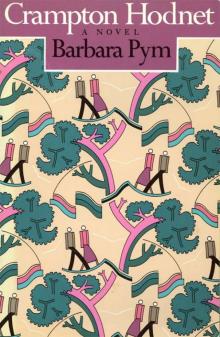 Crampton Hodnet
Crampton Hodnet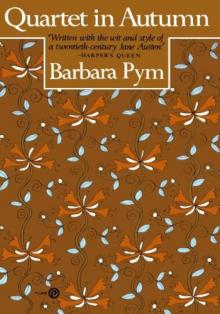 Quartet in Autumn
Quartet in Autumn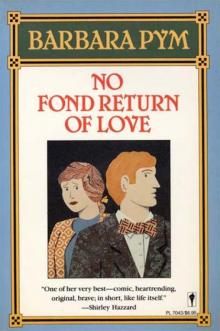 No Fond Return of Love
No Fond Return of Love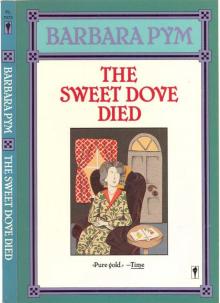 The Sweet Dove Died
The Sweet Dove Died Excellent Women
Excellent Women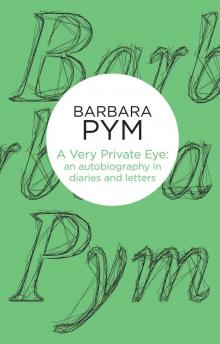 A Very Private Eye: The Diaries, Letters and Notebooks of Barbara Pym
A Very Private Eye: The Diaries, Letters and Notebooks of Barbara Pym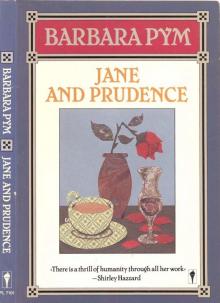 Jane and Prudence
Jane and Prudence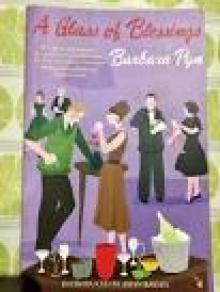 A Glass of Blessings
A Glass of Blessings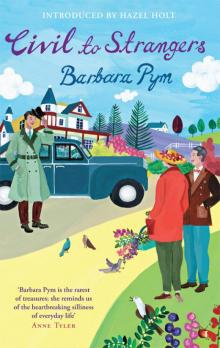 Civil to Strangers and Other Writings
Civil to Strangers and Other Writings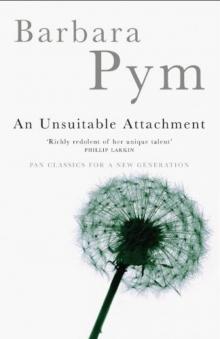 An Unsuitable Attachment
An Unsuitable Attachment Less Than Angels
Less Than Angels A Few Green Leaves
A Few Green Leaves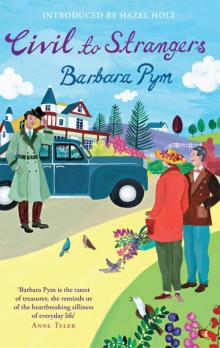 Civil to Strangers
Civil to Strangers